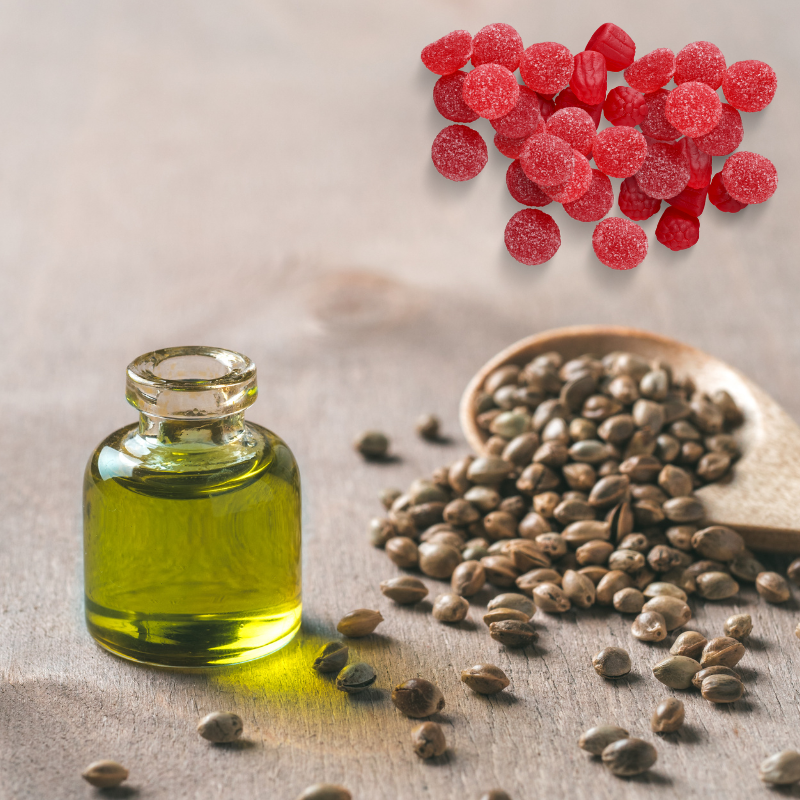Discover the distinctions between gummies, CBD oil and hemp seed oil, and learn about their unique uses and health advantages. Explore the benefits of joint oil supplements for overall wellness.
Hemp Seed Oil
Hemp seed oil with high GLA content is a valuable supplement for managing inflammation, supporting hormonal health, and promoting overall wellness.
- Source: Extracted from the seeds of the hemp plant.
- Composition: Contains little to no CBD or THC. Rich in omega-3 and omega-6 fatty acids, vitamins, and minerals.
-
Health Benefits:
- Skin Health: Moisturizes and soothes the skin, can help alleviate symptoms of skin conditions like eczema, psoriasis, and dermatitis by reducing inflammation and improving skin hydration.
- Hormonal Acne: By balancing hormones, GLA may also help reduce acne flare-ups, which are often linked to hormonal imbalances.
- Heart Health: The omega fatty acids may help reduce cholesterol levels and support cardiovascular health.
- Reduction of Joint Inflammation: The omega-3 and omega-6 fatty acids in hemp seed oil, particularly gamma-linolenic acid (GLA), have anti-inflammatory effects that can help reduce inflammation in the joints. This can be especially helpful for people with arthritis or other inflammatory joint conditions.
- Alleviation of Joint Pain: Regular use of hemp seed oil may help reduce joint pain and stiffness, making it easier to move and perform daily activities. While it may not be as potent as CBD oil, it can still offer mild relief for chronic joint discomfort.
CBD Oil
CBD oil offers a wide range of potential health benefits, making it a versatile natural remedy. However, it's important to consult with a healthcare provider before starting any new treatment, especially if you are taking other medications.
- Source: Extracted from the flowers, leaves, and stalks of the hemp plant, which are rich in cannabidiol (CBD).
- Composition: High in CBD, with varying levels of other cannabinoids like THC (usually less than 0.3% to be legal).
-
Health Benefits:
- Anxiety and Stress Relief: May help reduce symptoms of anxiety and stress.
- Pain Relief: Known for its potential to alleviate chronic pain and inflammation.
- Sleep Aid: May improve sleep quality and help with insomnia.
- Neuroprotective Properties: May support brain health and protect against neurodegenerative diseases like Alzheimer's.
- Symptom Relief: While not a cure, CBD oil can help alleviate symptoms related to cancer treatment, such as nausea, vomiting, and pain.
- Addiction Recovery: CBD oil may help those struggling with addiction by reducing cravings and withdrawal symptoms. It can be particularly helpful for opioid, tobacco, and alcohol dependence.
Hemp Farm Hemp Oil Capsules can serve as a Joint oil supplement, these capsules supports health benefits for overall wellness, joint health, reducing inflammation, and improving mobility.
Key Differences- Purpose: Hemp seed oil is primarily used as a nutritional supplement or skincare product, while CBD oil is used for its therapeutic effects on the body and mind.
- CBD Content: Hemp seed oil has almost no CBD, whereas CBD oil is rich in this compound.
- Legal Status: Hemp seed oil is widely legal and available, while CBD oil's legality varies depending on its THC content and local regulations.
Both oils offer distinct health benefits, making them valuable in different contexts.
COSTS
CBD oil is expensive for several reasons:
Complex Extraction Process- Advanced Techniques: Extracting CBD from the hemp plant requires sophisticated methods, such as CO₂ extraction, which ensures a pure and high-quality product. These methods are costly to perform.
- Precision and Purity: The extraction process must be precise to avoid contamination with THC or other unwanted compounds, adding to the cost.
- High-Quality Hemp: CBD oil is derived from high-quality, organically grown hemp plants, which are more expensive to cultivate than industrial hemp used for other purposes.
- Sustainable Practices: Many producers use sustainable and organic farming practices, which are costlier than conventional farming methods.
- Compliance: Producers must adhere to strict regulations regarding the cultivation, extraction, and sale of CBD. This includes lab testing for purity and THC levels, which incurs additional costs.
- Licensing and Permits: Obtaining the necessary licenses and permits to grow, extract, and sell CBD products is expensive.
Hemp Gummies and Capsules, the differences
Hemp Capsules
-
Form: These are pill-like soft gel gelatin capsules, typically filled with hemp oil or hemp extract. Typically, each capsule contains 1000 mg of oil.
-
Ingredients: Contain concentrated hemp oil, often with a focus on delivering nutrients like omega fatty acids. Some may also contain CBD.
-
Usage: Swallowed whole with water, offering a precise and controlled dosage.
-
Taste: Tasteless, which can be preferable for those who don’t enjoy the flavor of hemp.
Hemp Gummies
- Form: Chewable, flavored gummy candies. Typically, each capsule contains 300 mg of oil.
- Ingredients: Infused with hemp extract, which may include hemp seed oil or CBD, along with sugars and flavorings.
- Usage: Chewed like candy, making them a more enjoyable and convenient option for some users.
- Taste: Sweet and flavored, making them appealing for those who prefer a more enjoyable way to consume hemp.
In short, hemp capsules are a more straightforward, larger quantity of oil, no-taste option for supplementation, while hemp gummies offer a tastier way to take hemp.
References



